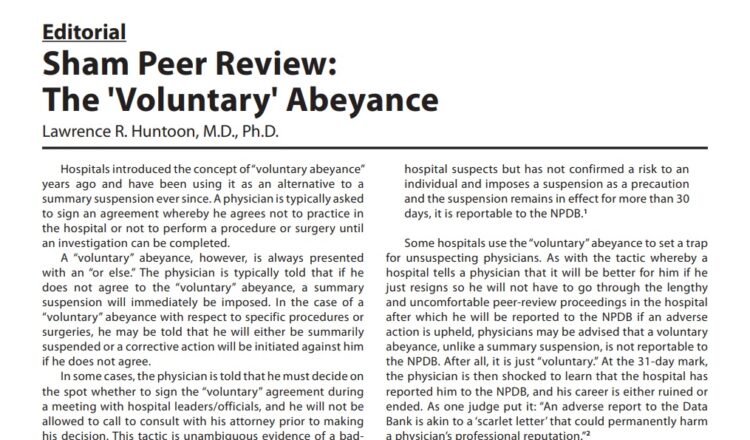Hospitals that want to remove a physician from their staff may offer a “voluntary abeyance” as an alternative to summary suspension. In the summer issue of the Journal of American Physicians and Surgeons, Lawrence Huntoon, M.D., Ph.D., explains the ramifications of this “sham peer review” technique.
A physician is typically asked to sign an agreement whereby he agrees not to practice in the hospital or not to perform a procedure or surgery until an investigation can be completed, Dr. Huntoon explains. “A ‘voluntary’ abeyance, however, is always presented with an ‘or else’”—usually an immediate summary suspension.
The hospital may say that it will not report a voluntary abeyance to the National Practitioner Data Bank (NPDB). However, at the 31-day mark, the physician may be shocked to learn that the hospital has nonetheless reported him to the NPDB, and his career is either ruined or ended. As one judge put it: “An adverse report to the Data Bank is akin to a ‘scarlet letter’ that could permanently harm a physician’s professional reputation.”
According to the NPDB Guidebook, a voluntary abeyance is exactly the same as a summary suspension.
Hospitals may try to use the voluntary abeyance as a method to deprive physicians of their due process rights, arguing that it is “voluntary.” This would generally violate the medical staff bylaws.
Physicians need to be aware of tactics hospitals use for bad-faith peer review against good physicians, Dr. Huntoon advises, and of possible defenses. These include negotiating a leave of absence, or seeking an injunction from a court. He cautions strongly against resigning during an investigation or to avoid an investigation.
The Journal of American Physicians and Surgeons is published by the Association of American Physicians and Surgeons (AAPS), a national organization representing physicians in all specialties since 1943.
Read Article: https://jpands.org/vol27no2/huntoon.pdf




